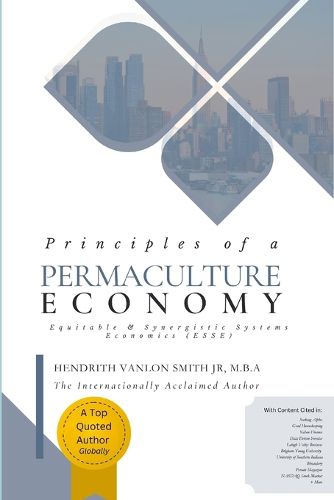Readings Newsletter
Become a Readings Member to make your shopping experience even easier.
Sign in or sign up for free!
You’re not far away from qualifying for FREE standard shipping within Australia
You’ve qualified for FREE standard shipping within Australia
The cart is loading…






This title is printed to order. This book may have been self-published. If so, we cannot guarantee the quality of the content. In the main most books will have gone through the editing process however some may not. We therefore suggest that you be aware of this before ordering this book. If in doubt check either the author or publisher’s details as we are unable to accept any returns unless they are faulty. Please contact us if you have any questions.
In "Principles of a Permaculture Economy," author Hendrith Vanlon Smith Jr. unveils a groundbreaking economic framework that merges the principles of permaculture with capitalist economics. This hybrid model, called "Permaculture Economics" or "Equitable & Synergistic Systems Economics (ESSE)," emphasizes environmental and social responsibility while amplifying profits and value for all participants. Discover how to create an economic system that is both sustainable and profitable! This book explores a wide range of economic principles related to capital, money, profit, loss avoidance, democracy, energy, technology, and more. It also introduces practical tools, including economic formulas and indices, to measure the success of a permaculture economy. If you are a policymaker, economist, or anyone passionate about creating a better economic future, this book is a must-read! Get your copy today and join the movement towards a more sustainable, equitable, and prosperous world! Key takeaways: A fresh perspective on economics A potentially transformative model Comprehensive and practical Focus on sustainability and profit A valuable resource for a better future Key Features: New Economic Framework: The book introduces a novel economic model called "Permaculture Economics" or "Equitable & Synergistic Systems Economics (ESSE)." Hybrid Approach: This model combines principles of permaculture (a sustainable agriculture and living design system) with capitalist economics. Sustainability and Responsibility: The model emphasizes environmental and social responsibility, aiming to harmonize economic activities with ecological balance. Profitability and Value: The book asserts that this model can lead to increased profits and value for all economic participants. Comprehensive Principles: The book outlines various principles related to capital, money, profit, loss avoidance, democracy, energy, technology, and more. Formulas and Indices: It introduces economic formulas and indices to measure the success of a permaculture economy. This book offers a fresh perspective on economics, presenting a potentially transformative model that could lead to a more sustainable, equitable, and prosperous future. The book's comprehensive approach, practical tools, and focus on sustainability make it a valuable resource for policymakers, economists, and anyone interested in creating a better economic system.
$9.00 standard shipping within Australia
FREE standard shipping within Australia for orders over $100.00
Express & International shipping calculated at checkout
This title is printed to order. This book may have been self-published. If so, we cannot guarantee the quality of the content. In the main most books will have gone through the editing process however some may not. We therefore suggest that you be aware of this before ordering this book. If in doubt check either the author or publisher’s details as we are unable to accept any returns unless they are faulty. Please contact us if you have any questions.
In "Principles of a Permaculture Economy," author Hendrith Vanlon Smith Jr. unveils a groundbreaking economic framework that merges the principles of permaculture with capitalist economics. This hybrid model, called "Permaculture Economics" or "Equitable & Synergistic Systems Economics (ESSE)," emphasizes environmental and social responsibility while amplifying profits and value for all participants. Discover how to create an economic system that is both sustainable and profitable! This book explores a wide range of economic principles related to capital, money, profit, loss avoidance, democracy, energy, technology, and more. It also introduces practical tools, including economic formulas and indices, to measure the success of a permaculture economy. If you are a policymaker, economist, or anyone passionate about creating a better economic future, this book is a must-read! Get your copy today and join the movement towards a more sustainable, equitable, and prosperous world! Key takeaways: A fresh perspective on economics A potentially transformative model Comprehensive and practical Focus on sustainability and profit A valuable resource for a better future Key Features: New Economic Framework: The book introduces a novel economic model called "Permaculture Economics" or "Equitable & Synergistic Systems Economics (ESSE)." Hybrid Approach: This model combines principles of permaculture (a sustainable agriculture and living design system) with capitalist economics. Sustainability and Responsibility: The model emphasizes environmental and social responsibility, aiming to harmonize economic activities with ecological balance. Profitability and Value: The book asserts that this model can lead to increased profits and value for all economic participants. Comprehensive Principles: The book outlines various principles related to capital, money, profit, loss avoidance, democracy, energy, technology, and more. Formulas and Indices: It introduces economic formulas and indices to measure the success of a permaculture economy. This book offers a fresh perspective on economics, presenting a potentially transformative model that could lead to a more sustainable, equitable, and prosperous future. The book's comprehensive approach, practical tools, and focus on sustainability make it a valuable resource for policymakers, economists, and anyone interested in creating a better economic system.